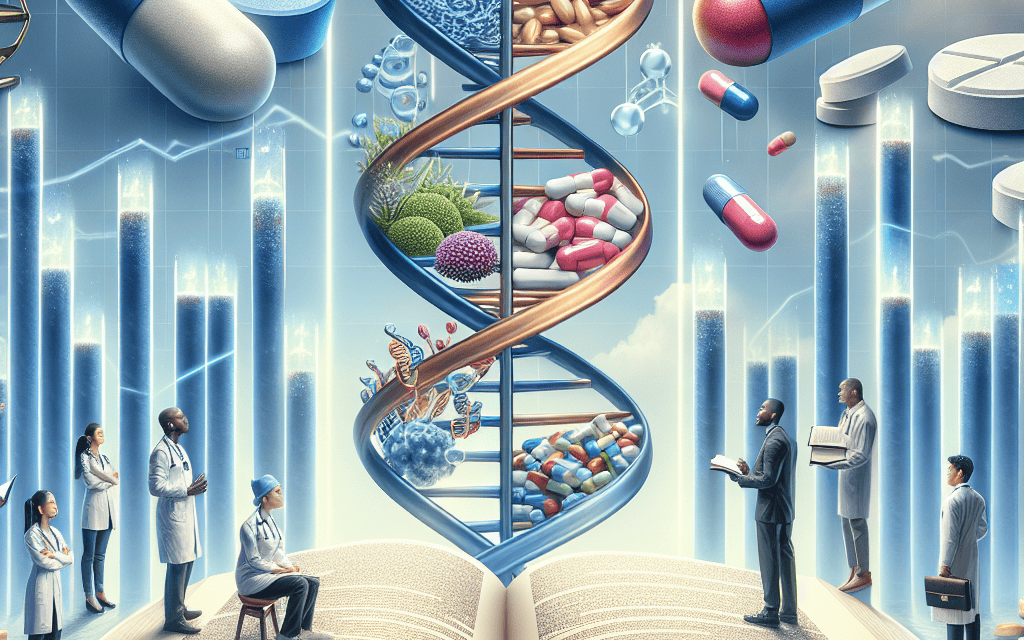-
Table of Contents
- The Increasing Role of Pharmacogenomics in Personalized Medicine
- 1. The Scientific Foundations of Pharmacogenomics
- 1.1 Genetic Polymorphisms and Drug Response
- 1.2 Drug Metabolism Pathways
- 1.3 The Role of Biomarkers in Pharmacogenomics
- 2. Clinical Applications of Pharmacogenomics
- 2.1 Oncology: Tailoring Cancer Treatment
- 2.2 Cardiology: Optimizing Cardiovascular Therapies
- 2.3 Psychiatry: Personalizing Mental Health Treatment
- 2.4 Infectious Diseases: Tailoring Antiviral and Antibiotic Therapies
- 3. Ethical Considerations in Pharmacogenomics
- 3.1 Privacy and Confidentiality
- 3.2 Informed Consent
The Increasing Role of Pharmacogenomics in Personalized Medicine

Pharmacogenomics, the study of how genes affect a person’s response to drugs, is a rapidly evolving field that is transforming the landscape of personalized medicine. By tailoring medical treatment to the individual characteristics of each patient, pharmacogenomics aims to optimize drug efficacy and minimize adverse effects. This article explores the increasing role of pharmacogenomics in personalized medicine, delving into its scientific foundations, clinical applications, ethical considerations, economic implications, and future prospects.
1. The Scientific Foundations of Pharmacogenomics
Pharmacogenomics is rooted in the understanding that genetic variations can significantly influence drug metabolism, efficacy, and safety. This section explores the scientific principles underlying pharmacogenomics, including genetic polymorphisms, drug metabolism pathways, and the role of biomarkers.
1.1 Genetic Polymorphisms and Drug Response
Genetic polymorphisms are variations in DNA sequences that occur among individuals in a population. These variations can affect how individuals respond to medications. For example, single nucleotide polymorphisms (SNPs) can alter the function of enzymes involved in drug metabolism, leading to differences in drug efficacy and toxicity.
One well-known example is the polymorphism in the CYP2C19 gene, which encodes an enzyme responsible for metabolizing drugs like clopidogrel, a blood thinner. Individuals with certain CYP2C19 variants may not effectively convert clopidogrel into its active form, reducing its efficacy and increasing the risk of adverse cardiovascular events.
1.2 Drug Metabolism Pathways
Drug metabolism is a complex process involving multiple enzymes and pathways. Pharmacogenomics focuses on understanding how genetic variations in these pathways affect drug metabolism. The cytochrome P450 (CYP) enzyme family plays a crucial role in drug metabolism, and genetic variations in CYP genes can lead to significant differences in drug response.
For instance, the CYP2D6 enzyme metabolizes approximately 25% of all prescription drugs, including antidepressants and opioids. Genetic variations in CYP2D6 can classify individuals as poor, intermediate, extensive, or ultra-rapid metabolizers, influencing drug efficacy and risk of side effects.
1.3 The Role of Biomarkers in Pharmacogenomics
Biomarkers are measurable indicators of biological processes or conditions. In pharmacogenomics, biomarkers are used to predict drug response and guide treatment decisions. Genetic biomarkers, such as specific gene variants, can help identify patients who are likely to benefit from a particular drug or who may be at risk of adverse reactions.
For example, the HER2 gene is a biomarker used in breast cancer treatment. Patients with HER2-positive tumors are more likely to respond to targeted therapies like trastuzumab, highlighting the importance of genetic testing in personalized medicine.
2. Clinical Applications of Pharmacogenomics
Pharmacogenomics is increasingly being integrated into clinical practice, offering new opportunities for personalized treatment strategies. This section examines the clinical applications of pharmacogenomics in various medical fields, including oncology, cardiology, psychiatry, and infectious diseases.
2.1 Oncology: Tailoring Cancer Treatment
Oncology is one of the most advanced fields in pharmacogenomics, with numerous examples of personalized cancer therapies. Genetic testing can identify specific mutations or biomarkers that guide treatment decisions, improving outcomes and reducing toxicity.
For instance, the presence of the BRAF V600E mutation in melanoma patients can predict response to targeted therapies like vemurafenib. Similarly, the presence of EGFR mutations in non-small cell lung cancer can guide the use of tyrosine kinase inhibitors, offering a more effective and less toxic treatment option.
2.2 Cardiology: Optimizing Cardiovascular Therapies
Pharmacogenomics is also making strides in cardiology, where genetic testing can help optimize cardiovascular therapies. For example, genetic variations in the CYP2C19 gene can influence the effectiveness of clopidogrel, a commonly prescribed antiplatelet drug.
Patients with certain CYP2C19 variants may require alternative antiplatelet therapies to achieve optimal outcomes. Additionally, genetic testing for variants in the SLCO1B1 gene can help identify patients at risk of statin-induced myopathy, allowing for personalized statin therapy.
2.3 Psychiatry: Personalizing Mental Health Treatment
In psychiatry, pharmacogenomics offers the potential to personalize mental health treatment by identifying genetic factors that influence drug response. Genetic testing can help predict which patients are likely to benefit from specific antidepressants or antipsychotics, reducing the trial-and-error approach often used in psychiatric treatment.
For example, variations in the CYP2D6 and CYP2C19 genes can affect the metabolism of antidepressants like fluoxetine and sertraline. Genetic testing can guide the selection and dosing of these medications, improving treatment outcomes and minimizing side effects.
2.4 Infectious Diseases: Tailoring Antiviral and Antibiotic Therapies
Pharmacogenomics is also being applied to infectious diseases, where genetic testing can guide the use of antiviral and antibiotic therapies. For instance, genetic variations in the IL28B gene can predict response to interferon-based therapies in hepatitis C patients, helping to identify those who are likely to achieve sustained virologic response.
In HIV treatment, genetic testing for HLA-B*5701 can identify patients at risk of hypersensitivity reactions to the antiretroviral drug abacavir, allowing for safer and more effective treatment regimens.
3. Ethical Considerations in Pharmacogenomics
As pharmacogenomics becomes more integrated into clinical practice, it raises important ethical considerations. This section explores the ethical challenges associated with pharmacogenomics, including issues of privacy, informed consent, and access to genetic testing.
3.1 Privacy and Confidentiality
Genetic information is highly sensitive and personal, raising concerns about privacy and confidentiality. The potential for genetic discrimination by employers or insurers is a significant ethical issue in pharmacogenomics. Ensuring the protection of genetic data and preventing unauthorized access is crucial to maintaining patient trust and promoting the adoption of pharmacogenomics in clinical practice.
Legislation such as the Genetic Information Nondiscrimination Act (GINA) in the United States provides some protection against genetic discrimination, but ongoing vigilance is necessary to address emerging privacy concerns.
3.2 Informed Consent
Informed consent is a fundamental ethical principle in medical practice, and it is particularly important in pharmacogenomics. Patients must be fully informed about the potential benefits, risks, and limitations of genetic testing before consenting to undergo testing.
Healthcare providers must ensure that patients understand the implications of genetic testing, including the possibility of uncovering incidental findings or variants of uncertain significance. Clear communication and education are





